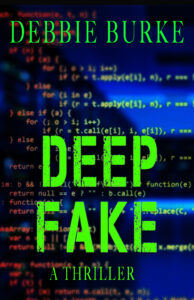
Photo credit: Tima Miroshnichenko-Pexels
By Debbie Burke
Recently a family member purchased a condo in Florida and ran into a disturbing glitch that could have cost him a lot of money.
In olden days, when you bought real estate, you delivered a cashiers check—on a physical piece of paper—to the escrow company. The escrow company then completed the transfer of title and you received a recorded deed to the property—also on a physical piece of paper.
Fast forward to the digital world of 2023. Physical pieces of paper have mostly been replaced with electronic records. In many real estate transactions, instead of a cashiers check, funds are sent via wire transfer. You make a request to your bank to shoot money through cyberspace to the escrow or title company. Once the money is received, the escrow closes, and a virtual deed is recorded that you can access online. There is no physical piece of paper unless you print it yourself.
Exchanging large sums of money without a physical, analog way to trace it sounds fraught with peril.
Turns out it is fraught with peril. Criminals know wire transfers are an excellent way to steal money. Fraud is rampant, costing an estimated $220 billion/year. According to a 2021 survey by American Land Title Association, ONE THIRD of transactions with title companies were targeted by fraudsters. In 71% of cases, full recovery of money was not possible.
Scary? You betcha.
So why use wire transfers when large amounts of money are at stake?
According to a source at the Florida title company, Florida is designated as a state with a high level of drug trafficking and money laundering. Because of that, the federal government wants financial institutions to use wire transfers to enable the government to track money laundering. The source couldn’t explain why a cashiers check couldn’t also be tracked since it leaves a paper trail.
When my relative said he preferred to pay by cashiers check, he was told that the title company would not accept a cashiers check, even though it is legal tender.
How does wire fraud happen?
In many cases, the thief contacts the buyer via email, posing as a real estate agent, title company, or bank official. The email appears genuine. The message says the escrow needs money sooner than anticipated, or the amount has been recalculated and the final amount is different (or some other excuse).
And here is the transaction number to wire the money to.
Of course, the transaction number doesn’t go to the escrow but rather to the thief.
It vanishes with no way to trace or recover the money.
According to Hari Ravichandran, founder and CEO of Aura.com:
“Can a Wire Transfer Be Reversed?
The short answer: Not usually.
Domestic transfers between accounts at the same bank usually happen within 24 hours. But with the rise of digital banking, wire transfers process almost instantly.
Fraudsters can quickly receive the money, move it into another account, and vanish before the victims have time to cancel or reverse the transfer.
You can only reverse a wire transfer if the sending bank notifies the receiving bank of your cancellation request before the receiving bank processes the transfer. Once the receiving bank accepts the funds, you cannot reverse the transaction.”
Here’s a link to the full article about wire transfer scams.
Victims are banks, title companies, escrow companies, and, of course, the poor consumer who thinks he’s just bought the home of his dreams.
The title officer assured my relative that all would be fine as long as he didn’t fall prey to bogus emails.
But…(there’s always a But)
His transaction ran into a different problem.
Cyberattack.
A few weeks before, when escrow opened, he had visited the title company in person and obtained a physical piece of paper with the wire instructions and the account number to send the money to. That way, he avoided the potential trap of bogus emails.
On closing day, he went to his bank in person and requested they wire the money from his account to the title company’s account, per the written instructions. The clerk entered all his information into the computer, a process that took 30+ minutes including verifying his identity and that he was indeed the owner of his account.
At last, she hit send and smiled. “All done!”
He requested a paper copy of the confirmation.
“Oh, you can access it online.”
He insisted on the paper copy.
Good thing.
A half hour later, he called the title company. No, they had NOT received the wire transfer. For the next two hours, he tried to call the bank but couldn’t get through constant busy signals.
Concerned, he returned to the bank. The clerk jumped up to greet him saying, “Oh, I’m so glad you came back! Our computers and phone systems crashed. I had no way to get hold of you because I couldn’t remember your name.”
His wire transfer had NOT gone through. It had vanished in cyberspace.
He spent the next two hours recreating the transaction with the clerk, but her computer kept freezing and wouldn’t accept the transfer. She called the bank fraud department, but was unable to speak with them because calls were repeatedly cut off. What the heck was going on?

Photo credit: Karolina Grabowska-Pexels
During that same time, other customers came into the bank complaining they couldn’t access their online accounts. More customers wanted to make deposits, but tellers couldn’t give receipts because their computers were down. All banking transactions ground to a halt.
Hmmm.
Later, my relative learned there had been a cyberattack affecting a region from South Carolina to Florida. It had not specifically targeted individual banks but rather was a Denial of Service (DoS) attack. The perpetrators, believed to be located in China, had flooded the net with cyberjunk, overloading the information superhighway. Digital transactions were gridlocked in a virtual traffic jam on a virtual freeway.
Fortunately, my relative had his physical piece of paper, his only proof of the transaction.
The following morning, the wire transfer finally went through and escrow closed.
But what if he had trusted the assurances of the title company and bank? He could have lost significant money. If only the title company had accepted a physical cashiers check, he could have avoided a lot of worry.
Coincidentally, the day after his close call, I happened to overhear a real estate agent talking about a recent sale he’d handled, also in Florida. He’d received an email supposedly from escrow, requesting money be wired a day early. Fortunately, he called to double-check and learned they had not sent the email.
If he had instructed his clients to act on the bogus message, they would have lost their money to fraudsters.
In contrast, according to a retired attorney, California financial institutions do not use wire transfers because of the high likelihood of fraud. Real estate transactions in California are done with cashiers checks.
Every day, we’re pushed farther into paperless banking. Every day more fraudsters hack accounts or otherwise compromise the security of financial transactions.
Until the financial world develops better security, whenever possible, I’ll stick with paper checks and physical documentation.
~~~
TKZers: Have you or someone you know been a victim of banking cyberfraud? Was the money recovered?
Does your state handle real estate transactions with wire transfers or cashiers checks?
~~~

Coming soon! DEEP FAKE, a new thriller by Debbie Burke.
What you see with your own eyes may not be real.
To be notified when DEEP FAKE is released, sign up HERE.

Debbie, I love this. My son bought a house last year and almost went through something like this. He ultimately did not, in part because his pain-in-the-posterior father insisted that the title company that was handling everything give him a paper receipt though “we don’t normally need to do that.” My response was, “I’ve never been accused of being normal.” Thanks for the cautionary tale. Enjoy your day!
Joe, thank goodness your son had a wise dad to save him from harm! Not everyone is fortunate enough to have knowledgeable advice from someone trustworthy. Hope he’s enjoying his new home.
“We don’t normally need to do that.” Any time I hear that, alarms go off.
I appreciate non-normal pals like you!
As a former banker, I saw this many times. Customers fall prey to hackers who send emails from “clients” that they have a new bank to wire funds to. Instead of picking up the phone and calling, they take the email at face value and lose thousands of dollars to fraud. BTW I’ve never worked at a bank where the customer didn’t get a paper copy of the wire instructions.
Jane, thanks for sharing your insider’s knowledge. My relative is also a former banker who supervised tens of thousands of real estate transactions during his career. A cashiers check was the gold standard.
In our so-called paperless society, paper is still necessary and prudent.
My brother and I were both beneficiaries of my mother’s life insurance policy. I requested a check for my half; he thought a wire transfer would be more efficient. The insurance company was in no rush to pay out, but I got my check, asked my brother if he’d gotten his money yet. He said he hadn’t, and it dragged on. And on. Turned out his bank gave a wrong account number (or something like that) and when the money didn’t arrive, and after MUCH “conversation” with the insurance company, it turned out they had simply cancelled the payout without telling my brother. He requested a paper check once things got straightened out.
On a more positive note, since he was the trustee of Mom’s estate, he got all the money and wired me my half without a hitch.
Terry, it’s hard enough to lose a loved one w/o the added burden of shenanigans by the insurance company. Makes you wonder if that’s how they make extra profit. Don’t want to shell out money? Just cancel the payout, erect roadblocks to discourage the beneficiaries, and hope they give up and go away.
Glad your experience ended well. Sorry for the loss of your mom.
I can relate to your friend, Debbie. My husband is old school. Any type of online payments he’s leery of, so when we refinanced for a lower rate in 2019, he insisted on bringing a physical bank check to closing. He also insisted on a physical deed on paper, not one we had to print ourselves. Gotta say, the bank was wonderful and fulfilled every request. If they hadn’t, he said, we would’ve looked elsewhere. I felt better about it, too, with such a large sum of money.
Sue, kudos to your bank for honoring legitimate requests from customers even if they’re not normal, as Joe mentioned above. Better safe than sorry where money is concerned.
That’s exactly the same thing we did in 2019. We dealt through our credit union. I have the entire abstract of title going back to when this land was homesteaded in the 1830s.
As President Reagan said, Trust-but verify.
We dealt with our credit union, too, Robert. Maybe they’re more amenable than regular banks.
Or smarter!
Thanks for this cautionary tale, Debbie. It’s amazing that in a state with lots of fraud, paper checks are not accepted for the real-estate transaction you described.
Interestingly, Florida has one of the highest rates of Medicare fraud. Millions of dollars are paid out to “providers” for medical equipment that was never provided.
Thanks for reminding us to never trust “the wire” without a piece of paper for confirmation. It makes me understand why some people want to deal with only hard, cold cash.
Thanks for the post!
Thanks, Steve. What I found interesting was the contrast between FL and CA–both states with high instances of fraud, drug trafficking, and money laundering. Why does one insist on wire transfers while the other insists on cashiers checks–both supposedly to thwart fraud???
My mother was a cyber fraud victim. She lost most of her life savings, over $100,000. Bank of America Fraud was able to recover a small portion of the money. My brother and I stepped in and blocked any sale of her home before the thieves convinced her to sell it. A security precaution we are now undoing so we can sell the house.
We were offered the option of e-transfer or paper check. We will be going with e-transfer with the account information being set up in person at closing.
Alan, glad your mom had you and your brother to watch out for her. Hope your in-person closing goes w/o a hitch.
What a frightening story! I’m so glad your relative took the extra steps to ensure the financial transactions had been made.
I am also old-school when it comes to money. Our electronic infrastructure is probably in just as much danger as our physical one.
Kay, you and I are in complete agreement about the fragility of electronic infrastructure. When the net goes down, for whatever reason, society is paralyzed.
An important, cautionary post, Debbie. Electronic transfers can be convenient, but can be rife for fraud. Caution is definitely warranted. I’m glad your brother avoided disaster, but what an onerous process for him.
From what I could see, Oregon still allows cashier’s checks for real estate transactions. Very good to know.
Have a great day! We are snowed in here, which is fine, since I’m got a lot of revision to do on my WIP 🙂
Thanks for the report about Oregon, Dale. Convenience isn’t convenient anymore when it becomes a tool for criminals.
Snow is great to keep a writer’s butt in the chair. Have a productive day!
How timely is this, Debbie?
We have a friend whose relative just found out yesterday that a real estate agent put a for sale sign on the relative’s 5 acres. Turns out, the real estate agent was duped by an email, purportedly from the owner of the 5 acres.
When said owner was contacted by an interested buyer, he was surprised that his 5 acres was for sale. Nipped that in the bud.
Deb, I think I met that same dude–he wanted to make me a really good deal on this bridge in New York.
Glad your friend caught on before damage was done.